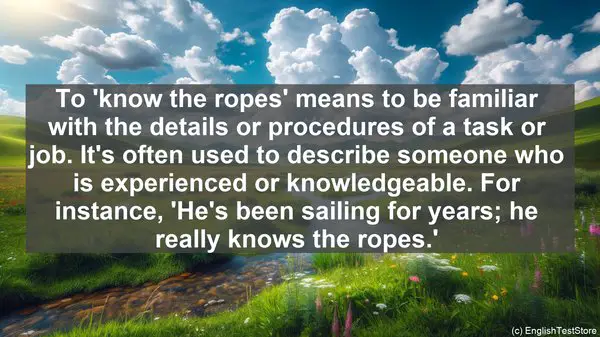1. ‘All hands on deck’
This idiom is used to signal that everyone needs to gather and help. It’s often used in emergency situations or when there’s a lot of work to be done quickly. For example, if there’s a sudden storm approaching, the captain might shout, ‘All hands on deck!’
2. ‘Batten down the hatches’
When a storm is imminent, seamen secure everything on the ship to prevent damage. ‘Batten down the hatches’ means to prepare for a difficult or challenging situation. It’s often used metaphorically to indicate getting ready for a tough time ahead.
3. ‘By and large’
This phrase means generally or on the whole. It’s used to give an overall assessment or summary. For example, ‘By and large, the voyage was smooth, except for a few minor setbacks.’
4. ‘Cut and run’
In maritime terms, ‘cut and run’ means to quickly set sail and leave. In idiomatic usage, it refers to leaving a situation abruptly, often without considering the consequences. For instance, ‘When the storm intensified, they decided to cut and run.’
5. ‘High and dry’
This phrase has a literal meaning of a ship being stranded on land, away from the water. Idiomatically, it means being in a difficult or helpless situation with no immediate solution. For example, ‘After the engine failure, we were left high and dry in the middle of the ocean.’
6. ‘Know the ropes’
To ‘know the ropes’ means to be familiar with the details or procedures of a task or job. It’s often used to describe someone who is experienced or knowledgeable. For instance, ‘He’s been sailing for years; he really knows the ropes.’
7. ‘Smooth sailing’
When everything is going well and without any problems, it’s referred to as ‘smooth sailing.’ It’s a positive expression indicating a trouble-free situation. For example, ‘The first leg of the journey was smooth sailing, but things got challenging later.’
8. ‘Take the helm’
In nautical terms, the ‘helm’ is the steering mechanism of a ship. ‘Take the helm’ means to take control or leadership. It’s often used metaphorically to indicate assuming responsibility. For instance, ‘With the captain indisposed, he had to take the helm.’

9. ‘Weather the storm’
When faced with a difficult or challenging situation, ‘weather the storm’ means to endure it and come out on the other side. It’s a metaphorical expression indicating resilience. For example, ‘It was a tough time, but we weathered the storm and emerged stronger.’

10. ‘A shot in the dark’
This phrase means a guess or an attempt without much knowledge or certainty. It’s often used when the outcome is uncertain. For instance, ‘We’re not sure if this plan will work; it’s just a shot in the dark.’
